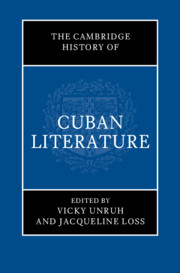Book contents
- The Cambridge History of Cuban Literature
- The Cambridge History of Cuban Literature
- Copyright page
- Dedication
- Contents
- Figures
- Contributors
- Acknowledgments
- Introduction Unfinished Histories
- Part I Literature in the Early Colony
- Part II Cuban Literature’s Long Nineteenth Century
- Part III Literary and Intellectual Culture in the Twentieth-Century Republic
- 13 The Literary Intellectuals of the Early Cuban Republic
- 14 The Invention of the Black Cuban in the Early Twentieth Century
- 15 The Fluid Expressive Communities of Cuba’s Interwar Avant-Gardes
- 16 Lydia Cabrera and Afro-Caribbean Imaginaries
- 17 The Fictions of New Urban Subjects
- 18 The Esthetics of Dulce María Loynaz
- 19 José Lezama Lima and the Orbits of Orígenes
- 20 Alejo Carpentier and Cuba’s Literary Twentieth Century
- 21 The Weighted Literary Islands of Virgilio Piñera
- Part IV The Revolution’s Literary-Cultural Initiatives and Their Early Discontents
- Part V Cuba and Its Diasporas into the New Millennium
- Epilogue
- Select Bibliography
- Index
- References
14 - The Invention of the Black Cuban in the Early Twentieth Century
from Part III - Literary and Intellectual Culture in the Twentieth-Century Republic
Published online by Cambridge University Press: aN Invalid Date NaN
- The Cambridge History of Cuban Literature
- The Cambridge History of Cuban Literature
- Copyright page
- Dedication
- Contents
- Figures
- Contributors
- Acknowledgments
- Introduction Unfinished Histories
- Part I Literature in the Early Colony
- Part II Cuban Literature’s Long Nineteenth Century
- Part III Literary and Intellectual Culture in the Twentieth-Century Republic
- 13 The Literary Intellectuals of the Early Cuban Republic
- 14 The Invention of the Black Cuban in the Early Twentieth Century
- 15 The Fluid Expressive Communities of Cuba’s Interwar Avant-Gardes
- 16 Lydia Cabrera and Afro-Caribbean Imaginaries
- 17 The Fictions of New Urban Subjects
- 18 The Esthetics of Dulce María Loynaz
- 19 José Lezama Lima and the Orbits of Orígenes
- 20 Alejo Carpentier and Cuba’s Literary Twentieth Century
- 21 The Weighted Literary Islands of Virgilio Piñera
- Part IV The Revolution’s Literary-Cultural Initiatives and Their Early Discontents
- Part V Cuba and Its Diasporas into the New Millennium
- Epilogue
- Select Bibliography
- Index
- References
Summary
This chapter examines early-twentieth-century representations of Black Cubans, primarily by white intellectuals seeking to consolidate an assuring image of nationhood that would be understandable within Eurocentric hegemonic epistemology. These include Fernando Ortiz’s early criminalization of Black Cuban religion, viewed as primitive and ignorant; terrorizing warnings by Ramiro Guerra against “Haitianization”; the Black protagonists in the first two novels by Alejo Carpentier, isolated in the first by a lack of agency and in the second enveloped in the uncanniness of the Surrealism-inspired “marvelous real”; portrayals by Lydia Cabrera of religious practices attributed to Black Cubans with condescension; early poems by Nicolás Guillén and his portrayal of “Cuban color” as a mestizo identity; and Ortiz’s subsequent concept of multiethnic transculturation, considered as a more detailed elaboration of Guillén’s earlier idea. But even this “mestizo happy-ending,” the chapter argues, suppressed sexual violence against the stereotyped Black female body, unaddressed until Nancy Morejón, writing after the 1959 revolution, located that experience in the literary renditions of Cuban history.
Keywords
- Type
- Chapter
- Information
- The Cambridge History of Cuban Literature , pp. 230 - 245Publisher: Cambridge University PressPrint publication year: 2024



